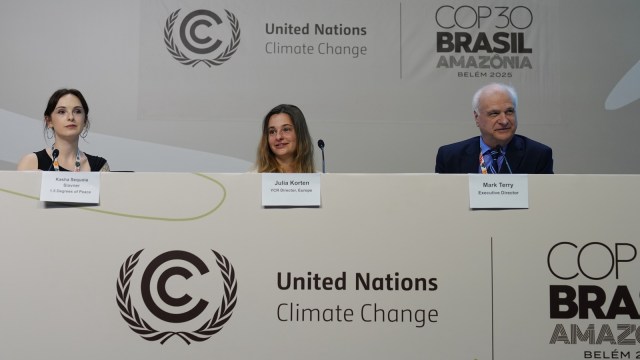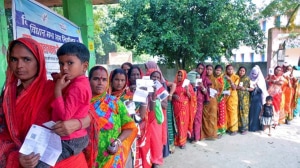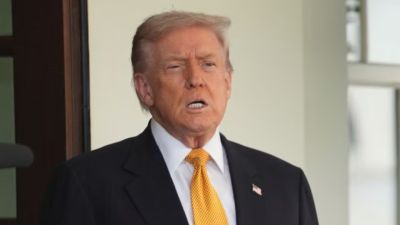Day after it was taken off agenda, India raises contentious finance provision at COP30 meet
Brazil said it would create other spaces in the conference to raise these issues, and offered to hold a special stocktake session on Wednesday where all these issues could be discussed in detail.
 (From left) UN Youth Climate Report executive director Mark Terry, programme director [Europe] Julia Korten, and Kasha Sequoia Slavner [1.5 Degrees of Peace] at the summit in Brazil, Tuesday. (AP)
(From left) UN Youth Climate Report executive director Mark Terry, programme director [Europe] Julia Korten, and Kasha Sequoia Slavner [1.5 Degrees of Peace] at the summit in Brazil, Tuesday. (AP)Stressing that lack of adequate climate finance continued to be the biggest stumbling block in enhancing global climate action, India Tuesday once again called for full implementation of a key finance provision in the Paris Agreement which has been ignored by the developed countries.
In two separate statements made on behalf of the BASIC countries (Brazil, South Africa, India, China) and Like-Minded Developing Countries (LMDCs) grouping at the COP30 climate meeting in Belem, Brazil, India emphasised the need for agreeing on a clear and universally acceptable definition of climate finance, and called for scaled-up financial flows for adaptation.
Importantly, it also demanded that Article 9.1 of the Paris Agreement, which states that developed countries “shall provide financial resources” to developing countries, be implemented in full. This demand, on behalf of a large number of developing countries, came just a day after Brazil managed to convince these nations not to press for the inclusion of this issue in the official agenda of the conference. Article 9.1 has emerged as one of the key issues for the developing countries in the last few months. These countries have been maintaining that the comprehensive finance agreement reached in Baku, Azerbaijan, last year had overlooked this provision of the Paris Agreement.
The Paris Agreement puts an obligation on the developed nations to both “provide” finance (Article 9.1) as well as “take the lead in mobilising climate finance” (Article 9.3). In the finance deal reached in Baku last year, the developed countries had agreed to collectively mobilise a sum of US$ 300 billion a year from 2035. The developing countries, however, had been demanding a sum of $1.3 trillion a year, and were deeply disappointed and angry with the deal.
Coming into COP30, these countries had tried to include a discussion on Article 9.1 in the official agenda. However, the host Brazil, which is presiding over the conference, managed to prevail over these countries to take this, and a few other contentious proposals, off the provisional agenda, fearing that these might lead to stand-offs and delay the adoption of the official agenda.
Brazil said it would create other spaces in the conference to raise these issues, and offered to hold a special stocktake session on Wednesday where all these issues could be discussed in detail.
One other such issue, in which India has a keen interest, is a discussion on unilateral trade restrictions like European Union’s Carbon Border Adjustment Mechanism which seeks to put additional tariff on imported goods whose production has a higher carbon footprint than what is allowed for European manufacturers of the same goods. India, China and several nations called such measures discriminatory and violative of international trade laws.







